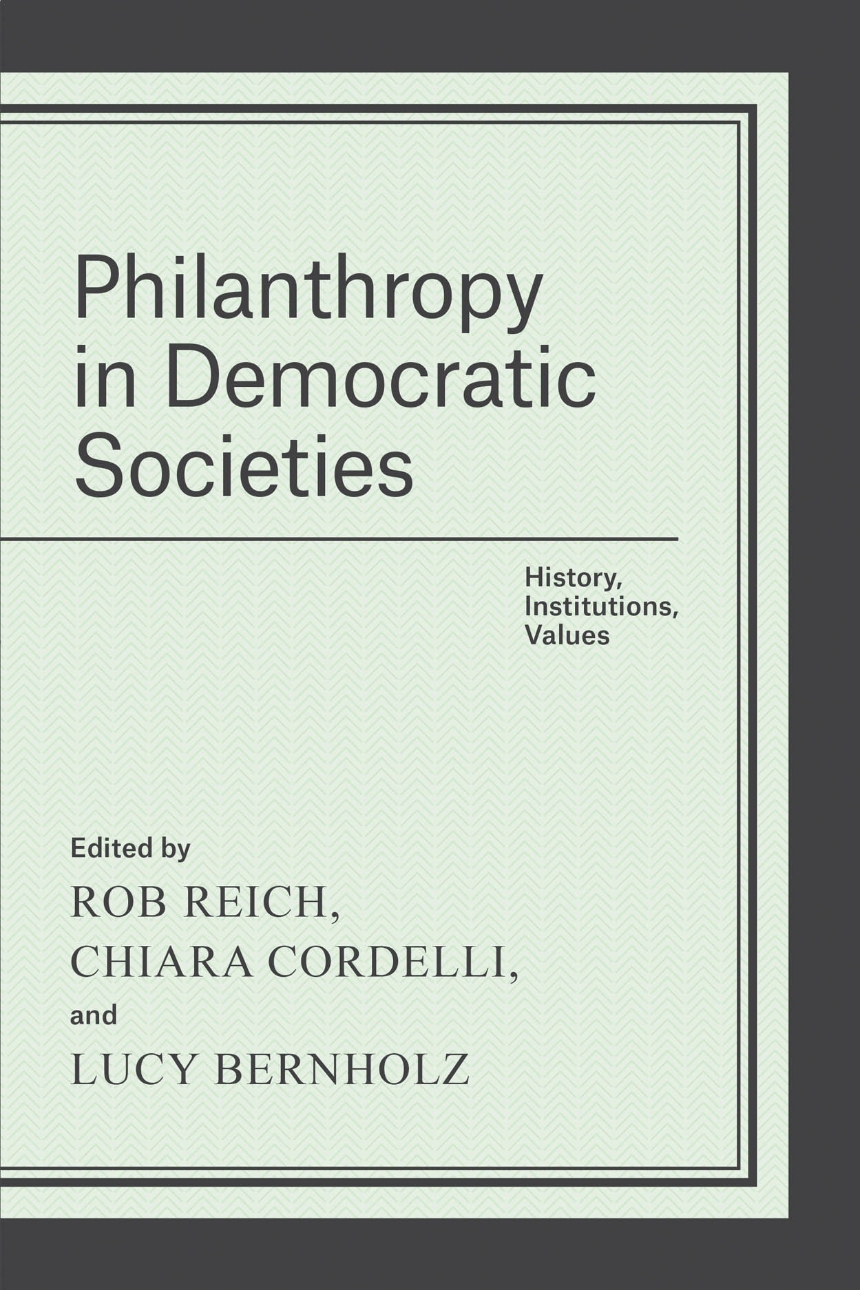Philanthropy in Democratic Societies
History, Institutions, Values
9780226335643
9780226335506
9780226335780
Philanthropy in Democratic Societies
History, Institutions, Values
Philanthropy is everywhere. In 2013, in the United States alone, some $330 billion was recorded in giving, from large donations by the wealthy all the way down to informal giving circles. We tend to think of philanthropy as unequivocally good, but as the contributors to this book show, philanthropy is also an exercise of power. And like all forms of power, especially in a democratic society, it deserves scrutiny. Yet it rarely has been given serious attention. This book fills that gap, bringing together expert philosophers, sociologists, political scientists, historians, and legal scholars to ask fundamental and pressing questions about philanthropy’s role in democratic societies.
The contributors balance empirical and normative approaches, exploring both the roles philanthropy has actually played in societies and the roles it should play. They ask a multitude of questions: When is philanthropy good or bad for democracy? How does, and should, philanthropic power interact with expectations of equal citizenship and democratic political voice? What makes the exercise of philanthropic power legitimate? What forms of private activity in the public interest should democracy promote, and what forms should it resist? Examining these and many other topics, the contributors offer a vital assessment of philanthropy at a time when its power to affect public outcomes has never been greater.
The contributors balance empirical and normative approaches, exploring both the roles philanthropy has actually played in societies and the roles it should play. They ask a multitude of questions: When is philanthropy good or bad for democracy? How does, and should, philanthropic power interact with expectations of equal citizenship and democratic political voice? What makes the exercise of philanthropic power legitimate? What forms of private activity in the public interest should democracy promote, and what forms should it resist? Examining these and many other topics, the contributors offer a vital assessment of philanthropy at a time when its power to affect public outcomes has never been greater.
Read the introduction.
344 pages | 2 halftones, 6 line drawings, 3 tables | 6 x 9 | © 2016
History: American History
Law and Legal Studies: Law and Society
Political Science: Political and Social Theory
Sociology: Social Institutions
Reviews
Table of Contents
Acknowledgments
Introduction
Introduction / Philanthropy in Democratic Societies
Rob Reich, Lucy Bernholz, and Chiara Cordelli
Part I: Origins
One / Altruism and the Origins of Nonprofit Philanthropy
Jonathan Levy
Two / Why Is the History of Philanthropy Not a Part of American History?
Olivier Zunz
Three / On the Role of Foundations in Democracies
Rob Reich
Part II: Institutional Forms
Four / Contributory or Disruptive: Do New Forms of Philanthropy Erode Democracy?
Aaron Horvath and Walter W. Powell
Five / Reconciling Corporate Social Responsibility and Profitability: Guidelines for the Conscientious Manager
Paul Brest
Six / When Is Philanthropy? How the Tax Code’s Answer to This Question Has Given Rise to the Growth of Donor-Advised Funds and Why It’s a Problem
Ray D. Madoff
Seven / Creating Digital Civil Society: The Digital Public Library of America
Lucy Bernholz
Part III: Moral Grounds and Limits
Eight / The Free-Provider Problem: Private Provision of Public Responsibilities
Eric Beerbohm
Nine / Philanthropy and Democratic Ideals
Ryan Pevnick
Ten / Reparative Justice and the Moral Limits of Discretionary Philanthropy
Chiara Cordelli
Notes
Bibliography
List of Contributors
Index
Introduction
Introduction / Philanthropy in Democratic Societies
Rob Reich, Lucy Bernholz, and Chiara Cordelli
Part I: Origins
One / Altruism and the Origins of Nonprofit Philanthropy
Jonathan Levy
Two / Why Is the History of Philanthropy Not a Part of American History?
Olivier Zunz
Three / On the Role of Foundations in Democracies
Rob Reich
Part II: Institutional Forms
Four / Contributory or Disruptive: Do New Forms of Philanthropy Erode Democracy?
Aaron Horvath and Walter W. Powell
Five / Reconciling Corporate Social Responsibility and Profitability: Guidelines for the Conscientious Manager
Paul Brest
Six / When Is Philanthropy? How the Tax Code’s Answer to This Question Has Given Rise to the Growth of Donor-Advised Funds and Why It’s a Problem
Ray D. Madoff
Seven / Creating Digital Civil Society: The Digital Public Library of America
Lucy Bernholz
Part III: Moral Grounds and Limits
Eight / The Free-Provider Problem: Private Provision of Public Responsibilities
Eric Beerbohm
Nine / Philanthropy and Democratic Ideals
Ryan Pevnick
Ten / Reparative Justice and the Moral Limits of Discretionary Philanthropy
Chiara Cordelli
Notes
Bibliography
List of Contributors
Index
